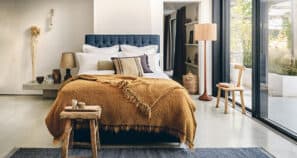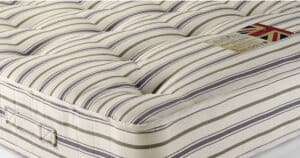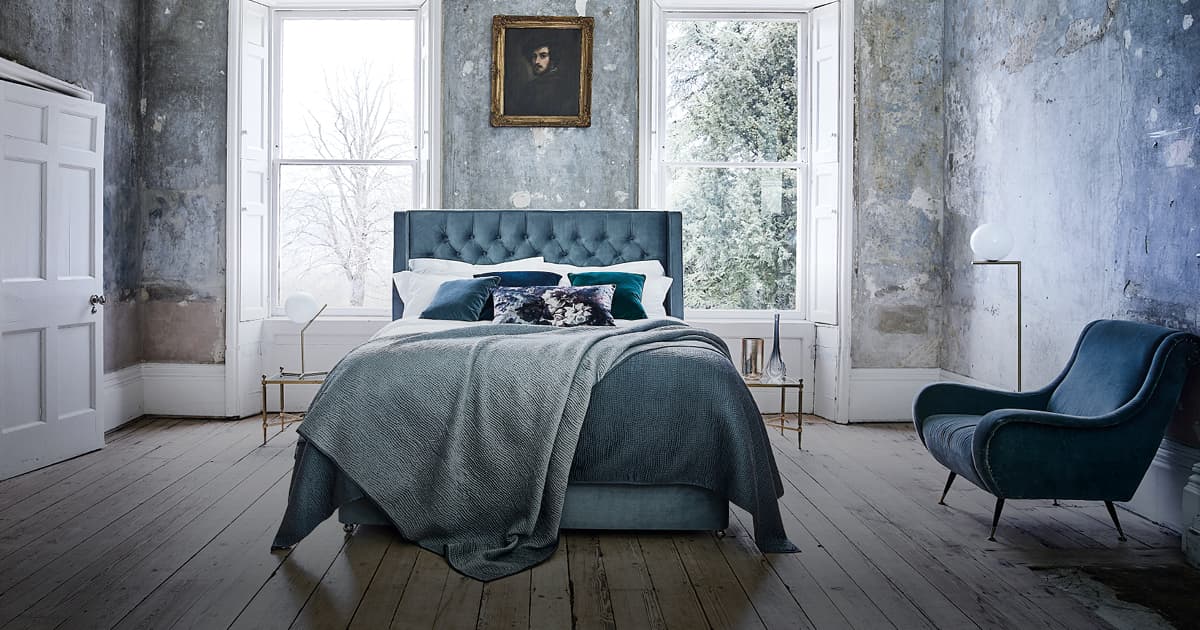
Important things to consider when buying new mattresses and how to pick the best bed for your B&B, Hotel or Holiday Rental – with The National Bed Federation
Thinking it’s time to buy new mattresses for your B&B bedrooms?
It’s so hard to choose the right bed, especially when it’s for your business and not your own, personal use. We all have different tastes when it comes to design, firmness and size, so how do you choose the best bed for your business?
We spoke to industry expert, Simon Williams, to find out what you should look for in particular when shopping for new beds.
Simon is the Marketing and Membership Manager for the National Bed Federation (NBF), the recognised trade association representing bed manufacturers and suppliers in the UK. The NBF provides professional and unbiased advice on everything you need to know about beds.
Read on to find out how to pick the best bed.
Whether you’re a B&B, hotel, holiday let, or glamping business, one of your ultimate goals is that your guests enjoy a good night’s sleep.
Simon Williams from the NBF suggested starting with what you would choose for yourself.
“Many people would use their existing product that they sleep on as a benchmark,” he said.
“The average, recommended replacement cycle is every seven years, but a hospitality venue may look to change their mattresses more often. So if you bought a bed four, five, or even six years ago, now might be a good time to replace it.
“Start by thinking about what you liked about your current bed when you bought it and whether you want to buy direct replacements or something new.”
Simon explained that most people would look to buy from retailers and manufacturers that they know so that they have quality assurance, but whoever you buy from, he strongly recommends trying a bed before you buy it.
“Go into a bed shop or furniture store and discuss your particular needs and budgets with the sales assistants,” he said.
“Don’t just buy something off the internet. How do you know how comfortable it is? Or what the quality will be like until you try it and see it in real life?
“So discuss your budgets and needs and try to hone in on a handful of products that suit those requirements. Then from that ‘shortlist’, lie down on them. Try them out.”
“The average, recommended replacement cycle for a mattress is every seven years.” – Simon Williams, NBF
Laughing he said: “This might sound a bit weird, but lie on the bed for at least five minutes. You need to lie there for at least five minutes because it’s not your bedroom, you’re not in your night-time clothes, and it will feel different.
“The store may also be cold and mattresses have a tendency to feel firmer and slightly more uncomfortable in cold environments, so you have to take that into consideration too.”
He also recommends that you move around on them to try and get a good feel for the product to see if they meet your requirements.
But what requirements should you have on your list?
Here’s some elements of bed-buying that you should consider and Simon’s advice for them.
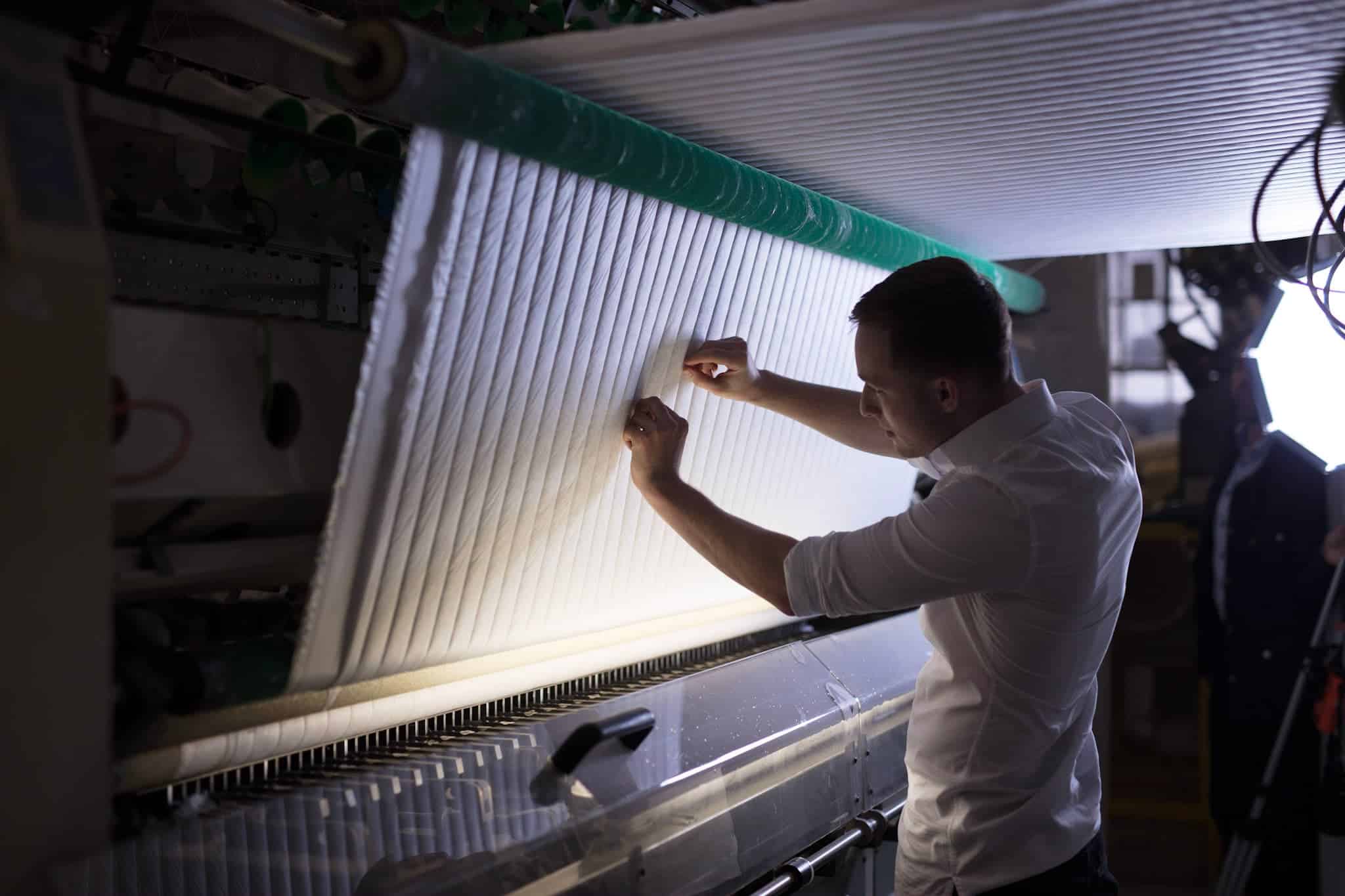
…Flammability of your B&B beds
?
Although it’s not always the first thing on your mind when buying a bed for yourself, you must make sure your mattresses meet certain standards if they are used commercially.
“You need to make sure the products you buy meet the UK flammability standards,” said Simon, “especially for B&Bs, guest houses and hotels.”
Simon explained that any mattress you buy should be classed as a ‘Medium Hazard’.
He said: “You need to make sure the mattress meets the standards for medium hazard and flame retardancy.
“There’s a British standard which is BS7177 and there should be a small label on the mattress with that BS7177 code on it. But it should also say ‘Medium Hazard’.”
If the label says ‘Low Hazard’, that particular product is for domestic use in someone’s home.
“The vast majority of bed manufacturers in the UK will make products to the medium hazard standard for the contract market,” said Simon.
“In a standard UK double, based on two adults sharing, each person has less space than a baby does in a cot” – Simon Williams, NBF
… Size of your B&B beds?
Depending on your hospitality business, the size of your beds may be restricted by the space you have available, but there’s more to it than just choosing between a single or a double.
“We know from research that about 40 to 45% of all of the beds sold in the UK are the standard UK double size,” said Simon, “which is interesting because a standard UK double is only 1.35 metres wides and actually, if you have two people in that bed, each person actually has less space than a baby does in a cot, believe it or not!”
So unless you want your guests playing sardines, the NBF recommends choosing slightly bigger beds for your business, if you can.
Simon added: “For example, if you can fit a king-size bed in your bedroom, then do it.
“A king-size bed is 1.5 metres wide, which doesn’t sound a lot more than the standard double, but that extra 15cm does make a big difference because there’s less disturbance between the two people sharing the bed.”
Simply put, the larger the bed, the less disturbance, which means a better night’s sleep for your guests.
“Think of the biggest bed you could put in the room, that doesn’t overwhelm the space, to give your guests a better night’s sleep if there’s two people sharing a bed,” said Simon.
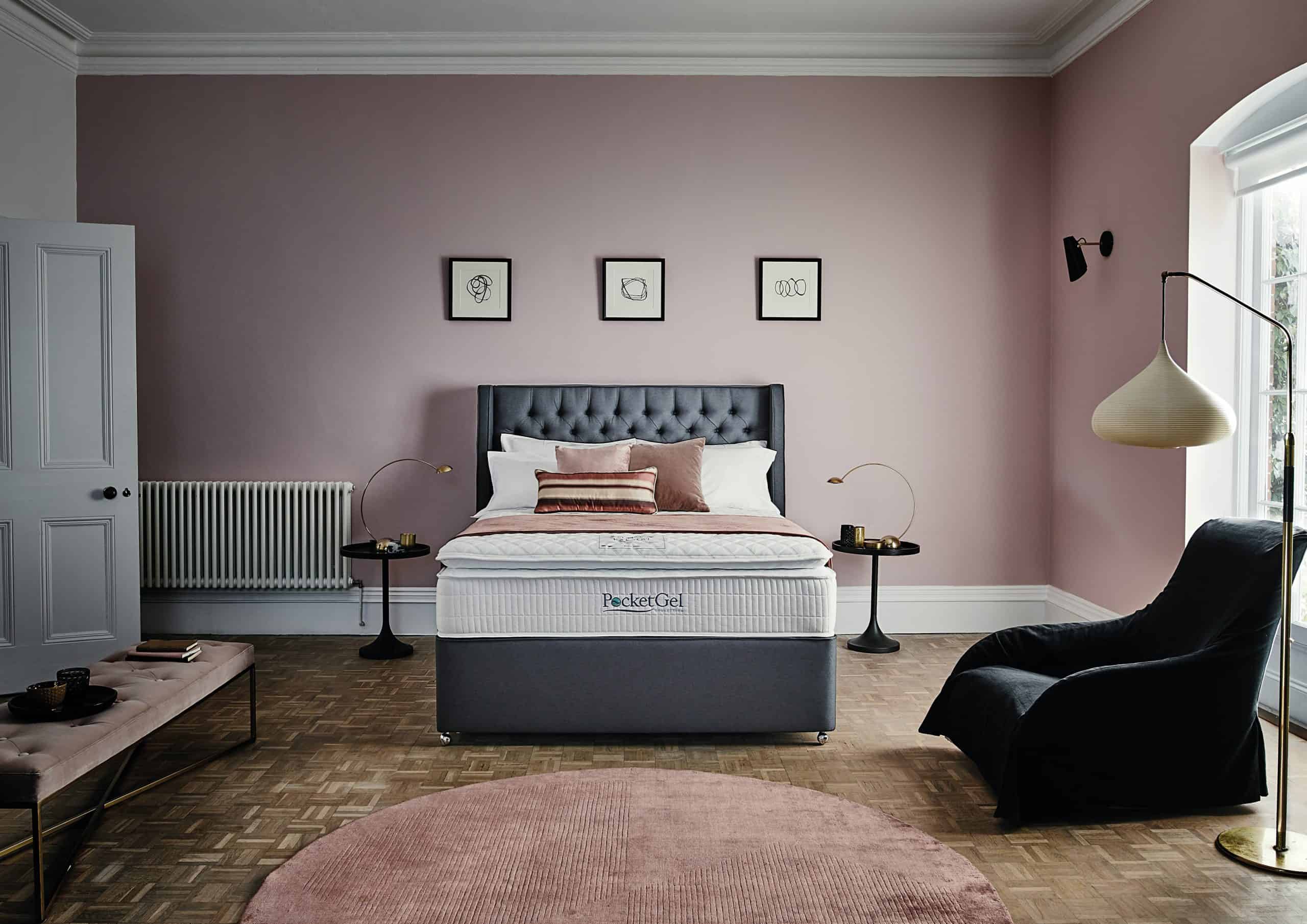
… Firmness of your B&B beds?
Comfort is so subjective, so how do you go about choosing the right level of firmness for your mattresses?
“A bed that I find extremely comfortable, you might find impossible to sleep in,” said Simon.
“Comfort is so subjective, so for commercial establishments, they’re probably better off choosing products that are middle ground.
“You certainly don’t want a mattress that’s too firm or too soft, so look for something that would be classed as medium support.”
By choosing something that’s in the middle, you’re more likely to please the majority of your guests.
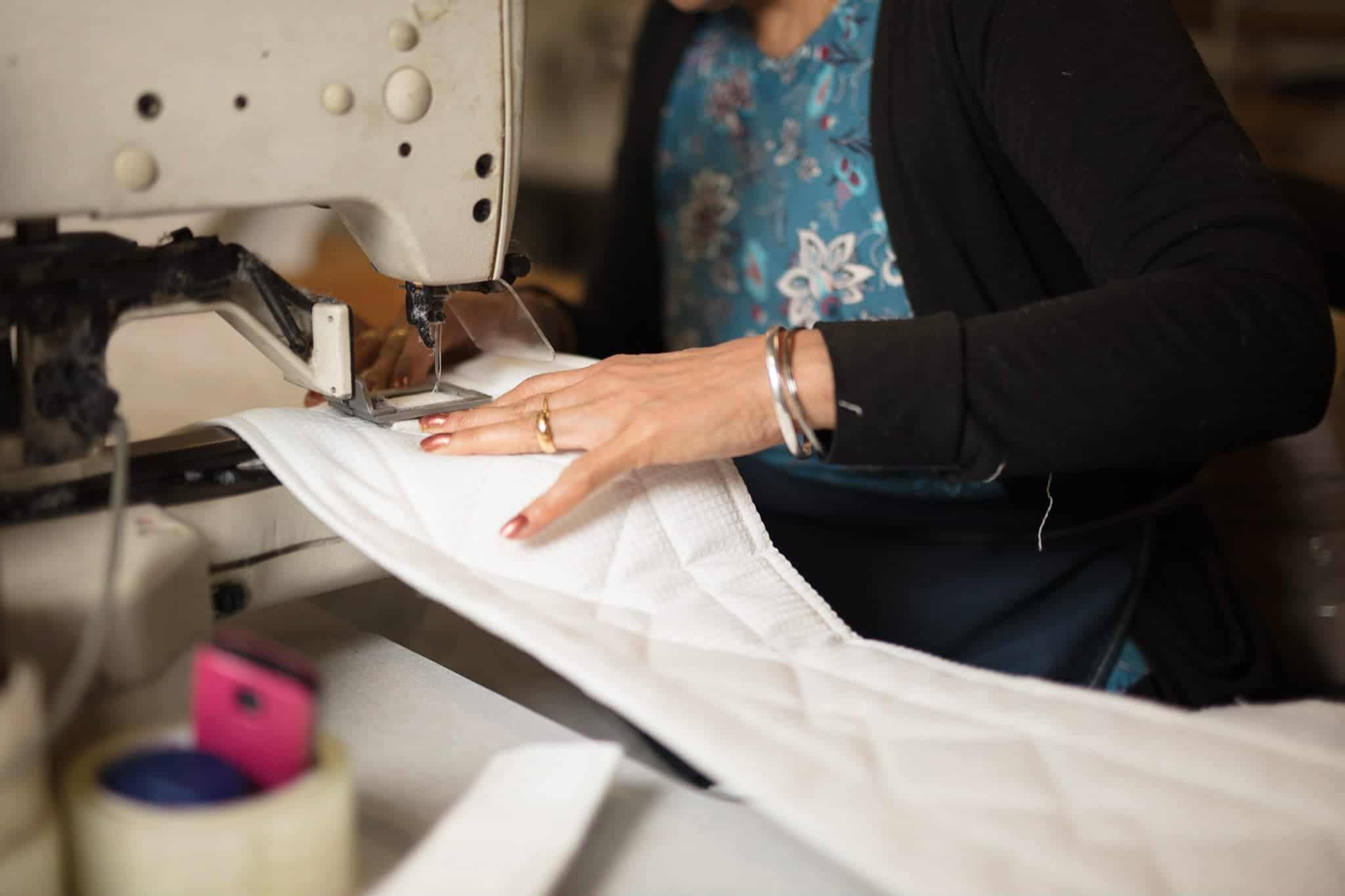
… Pricing of your B&B beds?
Every business has a different budget, so it’s hard to pinpoint an exact amount that you should spend on a new bed.
But whatever you budget, Simon said you shouldn’t be put off by higher prices.
“For example, if we recommend spending £1,000 on a bed, you might think that’s a lot for one mattress,” said Simon, “but actually, when you work it out, it’s not as bad as you think.”
He said: “So if you spread that cost over seven years, (the average replacement cycle), and you had someone sleeping in that bed every night, it works out at 40p per night and 20p if there are two people.”
He went on to explain that spending more money on a mattress isn’t as bad as it sounds, using another example.
“Let’s say you have an occupancy rate of 75%, which is 274 nights in a year, and you spend £1,000 on a bed that will last you seven years,” said Simon, “it then works out at 52p a night.”
Research by the NBF found that the average price paid by consumers for a bed is between £500 and £600.
“We’ve also found that amongst the younger consumers, they’re quite happy to buy a cheaper mattress on the basis it will last them two or three years and then get rid of it and buy a new one,” said Simon.
“Spend as much as you can on the bed.” – Simon Williams, NBF
“But we found the older groups tend to be happier spending a bit more on a bed and expecting it to last longer, so they’ll buy a better quality product.
“You just have to remember that you get what you pay for and there’s not much point in spending as little as possible on a bed because you’re essentially selling a good night’s sleep for your guests.”
Instead of starting with the carpets, curtains, decor, and different fixtures when working on your budget, Simon suggests starting with the bed.
“Start off with the bed because you’re selling a good night’s sleep,” said Simon.
“Then use the rest of your budget on the other elements of the room to create a perfect sleeping environment and a nice place for your guests to be.”
He added: “I would spend as much as you can on the bed because it’s the most important part.”
Remember, your guests won’t be sleeping on the really expensive carpets.
… Protection of your B&B beds?
Once you’ve bought your bed, you want to make sure it lasts, providing a good night’s sleep for your guests for years to come.
“It’s very important that you use a mattress protector on top of the mattress,” said Simon.
“And we would also recommend a mattress topper, too.”
A mattress topper is slightly thicker and you can have different covering materials on it to provide different levels of protection.
“They offer protection against, not just spillages, but also against bed bugs, house dust mites, and bacteria,” said Simon.
“So you can purchase those and place them over the mattress before you put the bedsheets on over the top.
“It will also help with the longevity of the product which is extremely useful in the hospitality industry.”
You can also buy normal mattress protectors to go on the mattress, and then a topper to go with it.
“Some of the toppers available now, also have, or act as, a mattress protector and also have the covering fabrics with the additional elements of protection,” said Simon.
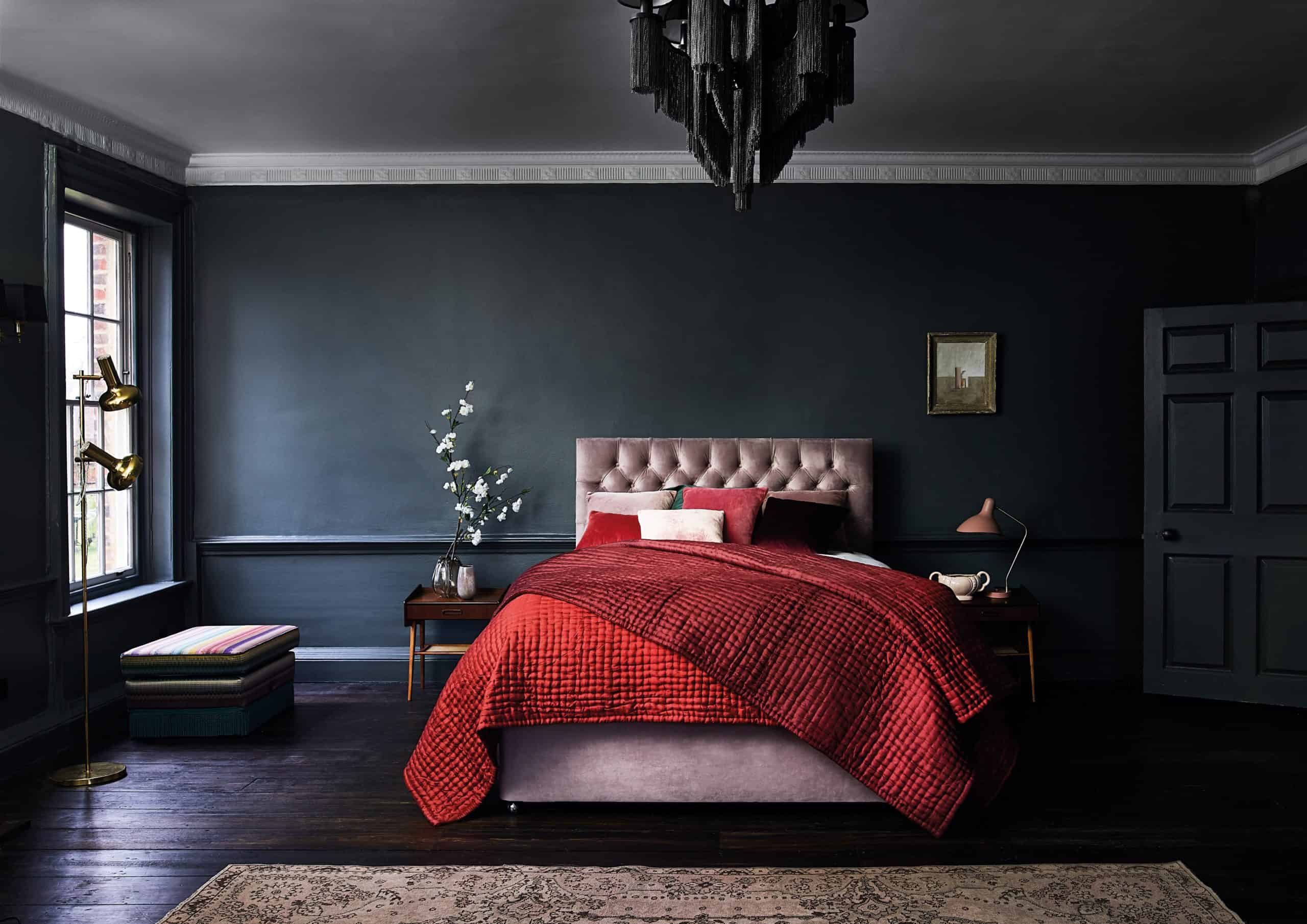
There are a couple of other regulations you should be aware of when choosing which beds to buy.
With such a wide variety of products and manufacturers to choose from, how do you know if they are correctly regulated and meet all the requirements?
“This is where I put my company hat on, so to speak,” said Simon.
“I’d suggest looking for brands that are made by members of the National Bed Federation because all of the NBF members are independently audited to make sure that their products meet all of the relevant UK legislation.
“And that’s not just for safety, but for the cleanliness of the fillings and also the trade descriptions.”
For example, if a manufacturer has been audited and it says their product meets the flammability standards, then you can pretty much guarantee that’s the case.
As much as we all enjoy online shopping and finding the best deals, it’s strongly suggested that you avoid buying mattresses from websites such as Amazon, Facebook or any other online trading platforms.
Simon said: “There’s always that chance that the products you’re buying may not meet all the UK regulations because the businesses selling on these platforms may not be investigated or audited properly, if at all.
“We always suggest buying from reputable sources and the beauty of that is, if you have any problems after making the purchase, you know it’ll get resolved.
“Too often do we hear from people who bought products from traders online and when they try to lodge a complaint, lo and behold, the people who sold the product have disappeared.”
He added:“Make sure you look for guarantees too, because they are usually a good indicator not just of the quality of the product, but the quality of the business you’re dealing with as well.
“Rather than a standard one year guarantee, look for maybe a three or five year guarantee instead. It’s a good indicator because it shows the trust that the business is putting in their products and themselves.”
So to ensure you’re purchasing quality guaranteed products, and for your own peace of mind, make sure that you buy from reputable manufacturers or retailers.
Visit the National Bed Federation website, bedfed.org for the complete list of NBF members, where you can also find the contact details for the different manufacturers and retailers.
For more information on how to create the perfect sleeping environment, check out our April 2021 magazine or head to: luxurybnbmag.com/perfect_sleeping_ environment
Top Tips – Things to remember when purchasing a new bed for your B&B Hotel or Holiday Rental Property
- Try before you buy. Go to a store in person and lie on the beds for at least five minutes
- Buy beds that are bigger than the standard UK double
- Flammability: Buy mattresses that meet the standards for medium hazard (BS7177)
- Medium firmness to please everyone
- Consider the sleeping environment – how can you increase the chances of a good night’s sleep? (E.g. lighting, noise reduction, colour choices etc.)
- Be prepared to spend more on a mattress that is better quality and will last longer
- But from reputable retailers such as companies who are NBF members. These companies have all been investigated and audited so you can guarantee they follow all the correct legislation
- Avoid buying mattresses from online retailers
- Recommended replacement cycle is every 7 years
- Invest in mattress toppers and mattress protectors
Links / URLs
luxurybnbmag.com/perfect_sleeping_environment
NBF SOCIAL MEDIA:
TW: @thebedfed
IN: @bedadviceuk
SLEEPEEZEE SOCIAL MEDIA
FB: @Sleepeezee
TW: @Sleepeezee
IN: @Sleepeezee


